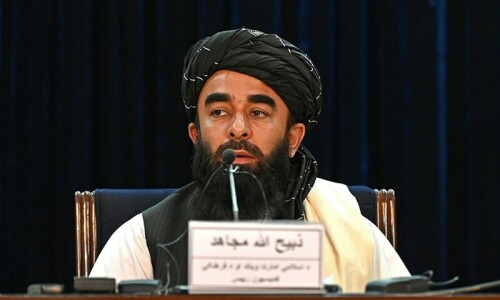Eight individuals were reportedly killed in strikes that occurred on Monday in the Afghan districts of Paktika and Khost near the Pakistani border, according to an official with the interim government of Afghanistan.
The Afghan authorities’ spokesperson, Zabihullah Mujahid, claimed in a statement that the airstrikes were executed by Pakistani aircraft. Regarding the development, neither the Foreign Office nor the Inter-Services Public Relations have yet to comment. Dawn.com has made contact with the two of them.
Zabihullah Mujahid, a spokesman for the Afghan interim government, stated that at “around 3am, Pakistani aircraft bombarded civilian homes” in the provinces of Khost and Paktika, which are close to the Pakistani border. He claimed that all eight victims were women and children.
According to Mujahid, planes bombed the Afghan-Dubai neighborhood in Khost’s Spera district and the Laman area in Paktika’s Barmal district, Dawn.com said.
He said that “houses of common people were targeted” and that two women were killed in Khost along with a house that was destroyed, and three women and three children were killed in Paktika where a house fell.
The attacks occur one day after President Asif Ali Zardari threatened revenge after seven soldiers—two of them were officers—were martyred in a terrorist attack on a North Waziristan security forces installation.
As he offered the two officers’ burial prayers, he declared that the nation would get revenge for the deaths and that the martyrs’ blood would not be in vain. According to the president, Pakistan would not think twice to retaliate if someone attacked it within its borders.
The horrific incident had been attributed to the Hafiz Gul Bahadar organization. According to security officials, the Gul Bahadar group’s fighters mostly operate out of Khost on the Afghan side of the border.
While Khost is situated close to North Waziristan, the province of Paktika is close to the South Waziristan District of Pakistan.
The Pakistani side claims that Abdullah Shah was the target of the strikes, but he is a resident of Pakistan, according to Mujahid. The same tribe’s members frequently cross the border and reside on both sides.
He declared: “The Islamic Emirate characterizes these as non-serious actions and a violation of Afghanistani territory and strongly condemns the attacks.”
“Pakistan should not blame Afghanistan for their problems and failure to control violent incidents,” the official continued. Such behavior may have terrible repercussions that are beyond Pakistan’s control.
The attacks were also confirmed by Pakistan’s banned Tehreek-i-Taliban (TTP).
The strikes coincide with increased communication in recent days between Pakistan and the Taliban leaders in Afghanistan.
The charge d’affaires for Pakistan in Kabul visited Mullah Shirin Akhund, the Taliban governor of southern Kandahar and a close ally of the Taliban chief, in Kandahar last week.
“Avenged blood of martyrs” – former minister from Balochistan
The previous interim minister for communication in Balochistan, Jan Achakzai, declared, “Pakistan has targeted the safe havens of terrorists near the border and avenged the blood of martyrs.”
He stated, “We will conduct a strong attack inside Afghanistan if there is any terror attack in Pakistan,” in a post on X. Recall that we value a Pakistani person’s life more than the all of Afghanistan.
In addition to offering his condolences for the soldiers lost in the incident in North Waziristan, former interim foreign minister Jalil Abbas Jilani stated that the army was “fighting the evil forces of terror originating from Afghanistan.” He wrote on X, “This cowardly terror attack will be avenged.”
A “turbulent page” in Pakistan-Afghan ties, according to Afghan journalist Bilal Sarwari, was marked by the strikes.
The new Pakistani government’s relationship with the Afghan Taliban is entering a tumultuous phase as a result of this. After the Taliban took control of Afghanistan in August 2021, Sarwari, who left the country, wrote on X that Pakistan “must now rue its investment and opportunities on the Taliban.”
Conflicts across borders in Kurram
Cross-border fighting was also reported near Parachinar in Kurram District, where Jalal Bangash, an elder of the Turi Bangash tribe, denounced the “baseless attack from Afghanistan.” He said that such incursions into Pakistani territory have to be avoided going forward.
People have begun leaving the Borki border area on both sides, according to Malik Nazeer, a local who spoke with Dawn.com.
Asif Durrani, Pakistan’s Special Representative for Afghanistan, stated two days ago that Islamabad possesses proof that the TTP was receiving funding from India via Afghan middlemen. The TTP is thought to have 5,000–6,000 terrorists who have sought refuge in Afghanistan.
“If we take their families into account, the number rises to 70,000,” Durrani stated on Saturday during a talk on the Afghan peace process organized by a think group in Islamabad.
The FO unequivocally denied claims in January of last year that claimed Pakistan had launched airstrikes in the Nangarhar province of Afghanistan.
Iran launched raids in Pakistan earlier this year against what it claimed to be camps for the militant organization Jaish al-Adl in the Balochistani border town of Panjgur. Pakistan responded with retaliation strikes.
There was a temporary rupture in relations between the two nations until things were handled to reduce tensions and rebuild diplomatic relations.








